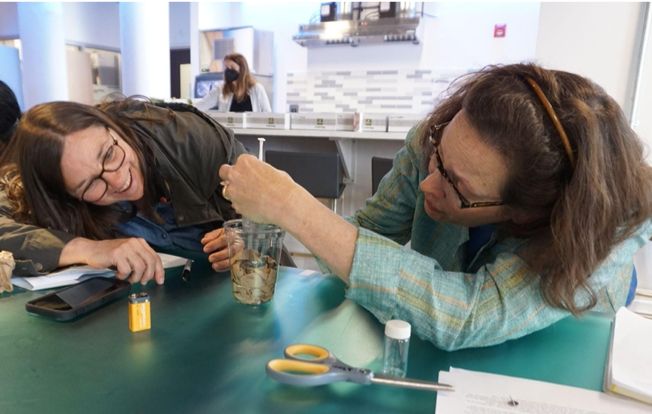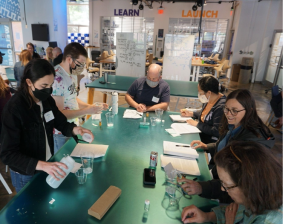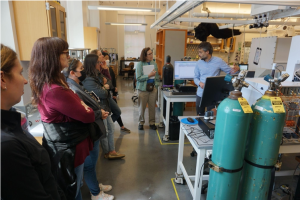IE partners with the Center for Hybrid Approaches in Solar Energy to engage STEM teachers in learning about chemistry innovations in the energy sector
June 3, 2022
Fourteen STEM teachers from across North Carolina convened in the Blue Makerspace in Carmichael Residence Hall at UNC-Chapel Hill on April 29 to learn about chemistry innovations in the energy sector from UNC researchers.
This workshop was sponsored by IE’s Center for Public Engagement with Science (CPES) and its NC Energy Literacy Fellows Program, a yearlong teacher professional development program that combines hands-on STEM investigations with place-based explorations of energy production facilities, energy research facilities and relevant careers. Program Director Dana Haine reached out to Dan Kurtz, technical communications and intellectual property manager for UNC’s Center for Hybrid Approaches in Solar Energy (CHASE) about partnering to showcase the cutting-edge research taking place within the walls of UNC’s research laboratories to teachers enrolled in the program.
”Having the opportunity to learn from researchers, in addition to getting a glimpse of their laboratories and meeting the graduate students who are typically not much older than their own students, is invaluable to classroom teachers,” says Haine. “It helps them to make real-world connections for their students.”
Haine invited Noah Kittner, an assistant professor from the Department of Environmental Sciences and Engineering in the Gillings School of Global Public Health, to open the workshop by describing current and emerging energy storage technologies and highlighting the need for innovation in this sector.
“Energy storage will play a critical role in meeting global decarbonization goals,” Kittner says. “Getting high-school teachers engaged in the state-of-the-art will only stimulate more creative solutions from younger generations.”
Kurtz described the research taking place across CHASE to optimize chemical reactions for applications in the energy sector, such as in the production of solar fuels (sunlight-driven generation of liquid fuels from carbon dioxide, nitrogen, and water). Teachers were excited to learn how the biological process of photosynthesis is informing the production of solar fuels via “artificial photosynthesis.”
“It’s really rewarding to work with the educators who will be teaching the next generation of scientists. It was a great experience to have not just chemistry, but biology, physics, and environmental science teachers all together discussing these topics and it shows that these real-world problems and the solutions to tackle them really span all of their subjects,” says Kurtz.
Ph.D. students in Alex Miller’s lab modeled a hands-on electrolysis activity teachers could conduct in the classroom. The activity emphasizes the scientific method and highlights how scientists are researching the sustainable production of energy-intensive materials such as fertilizers in addition to hydrogen, a clean, carbon-free fuel.
“During the pandemic, our usual modes of science communication were interrupted,” Miller says. “In response, our team came up with a low-cost, hands-on kit that we could ship to teachers to enable hands-on science supplemented by videoconferencing tools. This type of outreach is exciting for the future because it allows us to connect with students who are far from research universities. We were delighted to have the opportunity to share this new activity with teachers during this workshop.”

Teachers headed to chemistry labs after lunch to learn about research taking place to develop fluoride ion batteries from Ph.D. student Lauren McCrae with the Warren lab, solar energy conversion processes from members of Jillian Dempsey’s lab, and solar fuels from Renato Neiva, who serves as the CHASE lead research staff member in solar fuels product analysis.

“Today I learned there are still ‘real’ people working to solve problems, thinking about the future,” says one workshop participant who found the lab tours the most valuable part of the workshop.
The NC Energy Literacy Fellows Program, now in its sixth year, is made possible with funding from the Duke Energy Foundation. Duke Energy has generously supported the IE’s K-12 energy education programming since 2014. Learn more at https://ie.unc.edu/energy-literacy-fellows-program/
